

Södertälje, Sweden (AINA) -- When Iraqi refugees cram together in the small Swedish town of Södertälje it becomes World news. When they are expelled to an Iraq where they are no longer welcome the silence thickens. Refugees gather to watch the news. The Iraqi Prime Minister al-Maliki has met with the Pope and promised him that he will protect the Christians who wish to return to Iraq.
"How will he protect anyone? He doesn't even dare to leave the Green zone." One of the older men shakes his head and shows me a document from the Swedish Migration Board. It says that he is refused asylum. The Migration Board says it doesn't doubt the applicant's claims of murder threats, murdered relatives and persecution. It's just not enough to grant asylum in Sweden. The Migration Board opines that he does not have enough individual reasons to stay here.
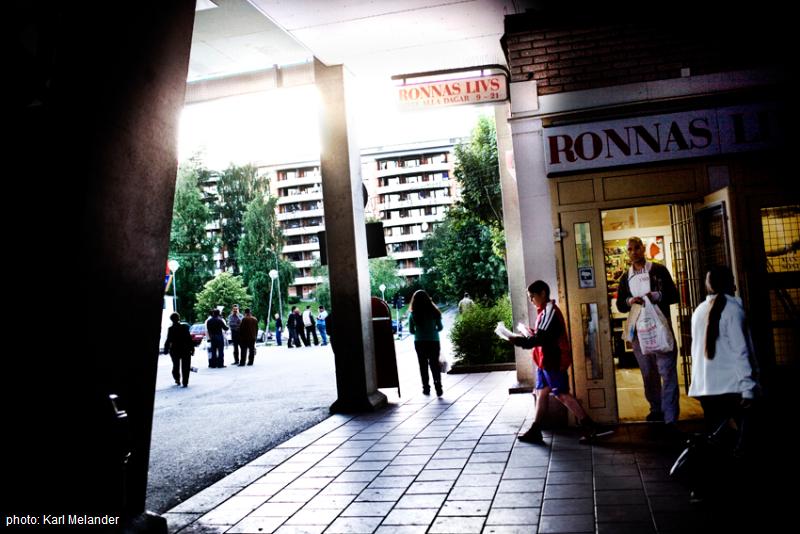
I live in a small city with beautiful Swedish pretzels as its symbol. The facades and the buildings do not differ much from other places in Sweden. The city is surrounded by water and elegant greenery that grows like nowhere else in the country. New neighborhoods with boastful stone villas are constructed by the canal and the lake.
It is the influx of people in 2008 that has put Södertälje on the world map. The Iraqis that are packed together in Södertälje are even discussed in the American Congress. The small town inhabits more refugees from the ongoing Iraq war than the entire U.S.A.
It's been thirty years since the Swedish welfare state's working class neighborhoods Ronna and Hovsjö were filled with new immigrants. In the factories of Astra and Saab-Scania you could hear Greek, Finnish, Hungarian, Yugoslavian and Turkish. And then there was a language that people couldn't figure out what to call in Swedish. To begin with it was called Assyrian, but then a more religious group broke out and started calling it Turabdin, Suryoyo, Arameic, Suryani, and finally it was decided that it would be called Syrian.
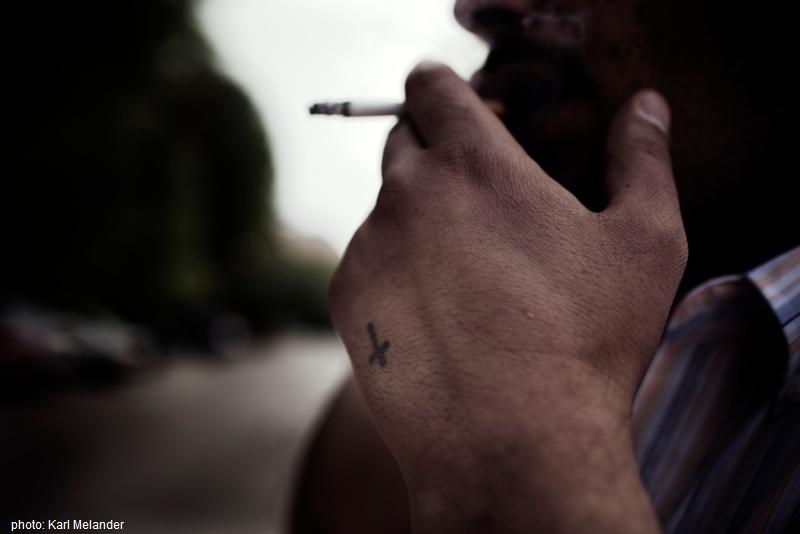
The people also got two different denominations, Assyrians and Syriacs. Thirty years later a third denomination was added: Chaldeans. I personally stick with Assyrian.
Regardless of what we call ourselves and why we haven't been able to decide what we should be called, we are part of the story of modern Sweden. It started in 1967 when two air planes were filled with so called quota refugees; Assyrians without a state that had "fled" to Lebanon from Turkey and Syria. The planes landed in Sweden. The Swedish industry was screaming for laborers and the Assyrians, most of them young, were invited to dig in.
Nobody had any idea that two wars would eventually make Södertälje the capitol of Assyrians all over the world. Welcome to Mesopotälje! The year was 1974, Abba's song Waterloo had besieged Germany and we who were kids at the time thought it was super cool to travel to the home country of the blond-haired pop group. It had also been the home country of my grandparents for some time. Not to mention all our cousins that lived there. My younger sister, my mother, my uncle-in-law, and a priest went by train from Frankfurt all the way to Södertälje station. The trip was imbued by the latest development in Cyprus: Christians vs Muslims. Where were we in all that? We were both Christians and Turks, well Turkish citizens at least, and we loved Turkish music.
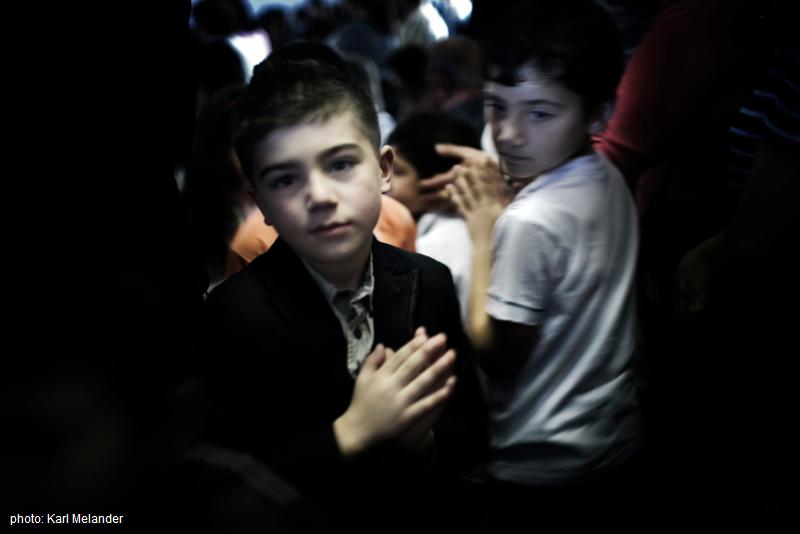
While the grown-ups kept on arguing about whether there would be a war or not, my sister and I entertained ourselves by singing "Waterloo, nananana, Waterloo, nananana..." We also talked about our cousins that we were finally going to meet again. And about our uncle that had taken care of us in Germany while our parents worked double shifts. We were instructed to say that he was our brother; otherwise he'd be thrown out of the country.
When the train arrived at Södertälje station our uncle Faruk, 23, was there, dressed like a hippie, and with open arms. We heard "Södertälje Central" in the speakers. It was summer. Everything was in bloom and green. Everyone was smiling.
We came to 99, the address of grandmother and grandfather. Ninety nine was one of the first words I learned in Swedish. We ran to the room where our cousins were waiting. They gave us Swedish treats like ice creams Piggelin and Åttioåttan, pastries like negerbollar and dammsugare, and Swedish lemonade and cinnamon buns. We jumped on the three beds that covered the whole room and managed to take down a bookcase filled with pieces from Saab-Scania. Faruk had become the factory's champion in something that was called both ping pong and table tennis.
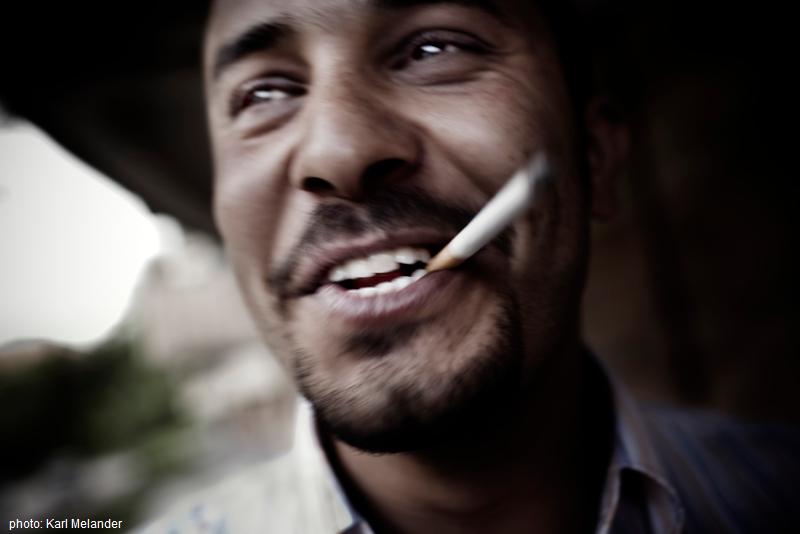
My sister and I lived with our oldest uncle, Malak, and the other adults stayed with grandfather. My two youngest uncles, Ibrahim and Nebil, that are both in my age, stayed with us children. It was a wonderful summer. Early in the morning we would help uncle Malak to put up his booth at Södertälje square where he sold fruits and vegetables. The grown-ups were busy cooking, eating, playing cards, cooking again, eating, playing cards and discussing politics. They were worried. Something terrible was about to happen.
A Greek Cypriot named Makarios had declared war on Turkey. The wheel was set in motion. In my home town of Midyat Christian Assyrians were suddenly accused by their Muslim neighbors of being traitors. Muslims had held a large demonstration and fights broke out between Christian and Muslim youth. One of the Muslim clan leaders had managed to temporarily end the violence, but the situation was still dangerous. The elders hadn't forgotten the genocide during WWI and they spread the fear to the younger.
During WWI 2.65 million Christians were killed in the east parts of Turkey. The exact number is still debated and Turkey has yet to acknowledge the genocide; when France recently did so it led to tense relations between the countries. In Turkey the chief editor of a magazine that had written about the genocide was murdered. Speaking of persecution is controversial. It's like we can only fit a certain number of persecutions and genocides in a collective history.
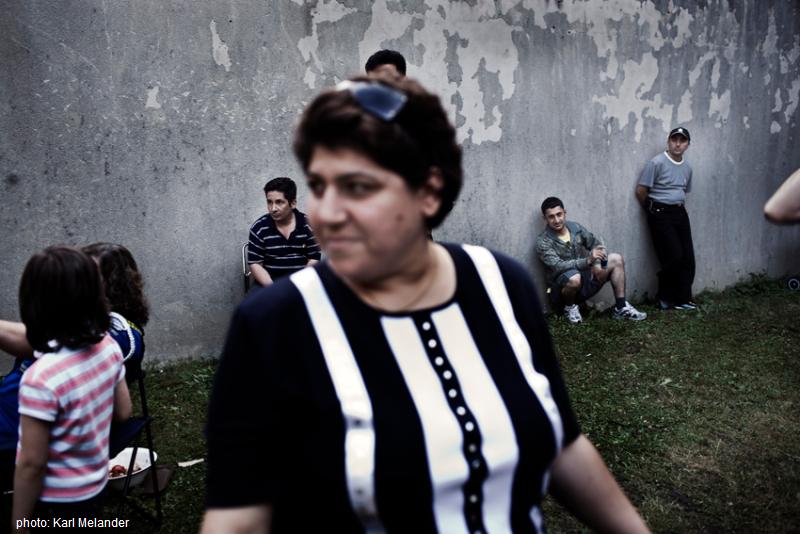
My father's father was one of the survivors. Mother's father, who was a little younger, spent four years in prison. The torture he endured was something he always came back to when he told stories from home. A couple of days before our return to West Germany came the deathblow. The grown-ups had a loud and agitated argument. Malak wouldn't allow us to leave. If we stayed in Sweden we would be more able to help our relatives in Turkey.
The adults gathered in the 99 to discuss the future. It didn't seem possible for Assyrians to stay in Turkey anymore. And the doomsday prophets were proven right. Almost. Turabdin today is nearly emptied of Assyrians. Only a sliver, a few thousand Assyrians, remain in the area. In Sweden alone there are today 40,000 people that originate from Turabdin. Half of the Assyrians living in Mesopotälje come from there. The rest are from Syria, Lebanon and Iraq. Only a few are from Iran.
I and the other kids who first came to Södertälje soon found ourselves in something of an identity crisis. In school we were taught to think individually and to think of our own needs first. At home we were given strict orders not to act selfishly. The needs of other family members had the upper hand. We learned that lying was a sin. But to stay in Sweden we lied to the Migration Board and pretended that mom was the sister of my aunt-in-law. We cheated in all ways we could in order for us to stay in Sweden and to rescue more Assyrians who risked death in Turkey.
Two months later we had our first Swedish apartment. It was officially Faruk's. Since he worked at the Saab-Scania factory he managed to get an apartment quickly; three rooms and a kitchen that were always occupied by relatives and other Assyrians that had recently arrived. Faruk became known as one of "the fixers". He did kher (charity), smuggled people over borders, interpreted at the Migration Board, and arranged apartments and jobs. The rest of us were his assistants.
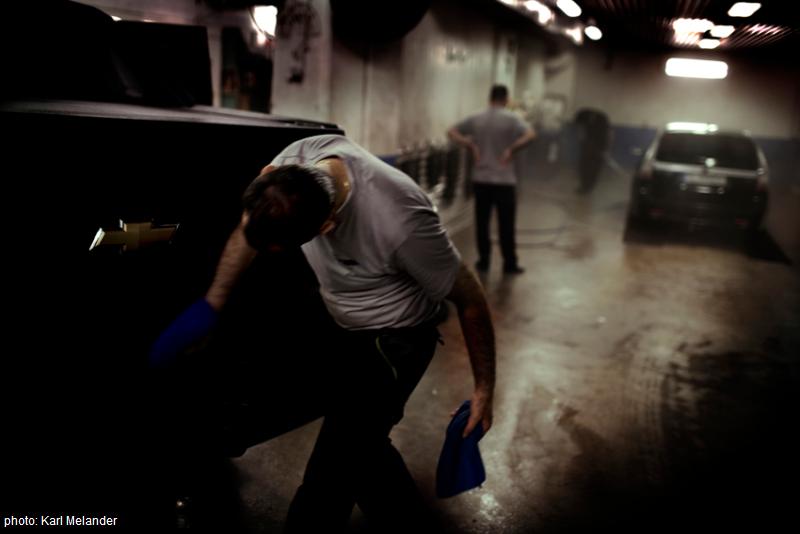
Some thirty years later our town becomes World news. Mesopotälje has taken in more refugees from war-torn Iraq than has the U.S. Yes, more refugees than most other European countries. 6,000. Syria and Jordan has received more than 2 million, but it is from Södertälje that every news channel chooses to report from. The news is simply the large number of refugees. When it comes to the reasons to why they are there, that the minorities in Iraq have been ethnically and religiously cleansed, most of the media stay silent.
When the American troops drove in to Iraq in the spring of 2003 many of the Iraqis cheered. Finally they were to be freed from the heavy pressure of the dictator. They waved flags and flowers. Among those were the Christian aboriginals of Iraq -- the Assyrians.
A year later, in June of 2004, a missile was fired at a church in Baghdad. In the terror war between religious groups that broke out after the US invasion, civilians of all religions and ethnicities have suffered greatly. The most defenseless are the minorities. The Christians have become an easy target for different Islamic militia groups. Whether they want to or not, they are seen as an ally to the enemy, the U.S.A., simply because they share religion.
Many Assyrians also started working for the Americans right after the invasion, and that aided the collective stamping of the Assyrians as traitors. When the security situation deteriorated, the kidnappings, rapes and murders started. Those who had helped the Americans were forced to flee in panic.
They begged their liberators for help and protection. But the Americans, their fellow Christians, did not show up. Jihadists delivered DVD's to every Christian home which contained photos of young Assyrian men that had their heads cut off in front of the camera.
To be able to stay in their neighborhoods, Christians were forced to pay taxes to the warlords. Baghdad was steadily emptied of Assyrians. Already in 2005 the UN estimated that a third of those who left Iraq were non-Muslims. The majority of them were Assyrians. Today, Assyrian organizations that have conducted investigations together with other international human rights organizations estimate that half of Iraq's Assyrians have fled. In 2003 there were 1,2 million Assyrians in Iraq, today not even half remain.
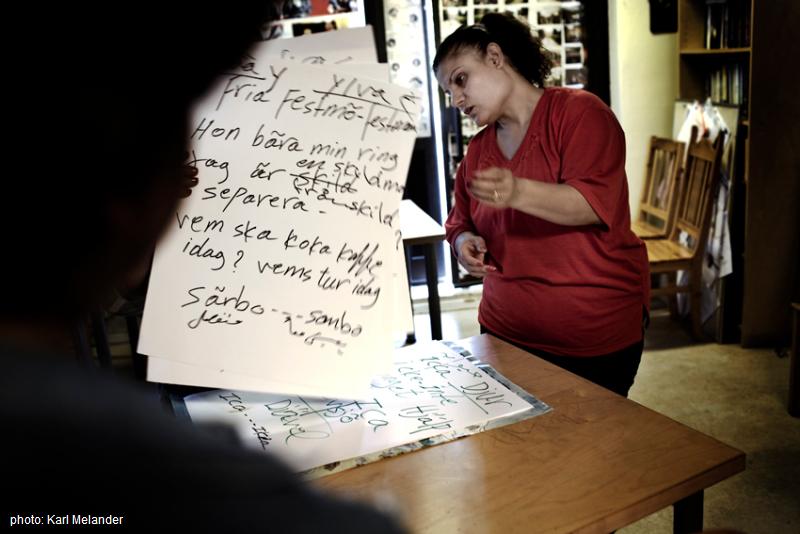
Many of those who are still in the country would leave as soon as they could, if they could. Mesopotälje would be the obvious choice, with its soccer teams Assyriska and Syrianska, its satellite TV Suroyo, and the Archbishop for the Syrian Orthodox church of Scandinavia.
The people of Mesopotälje have reluctantly become part of the war. New Iraqi refugees come to the municipality every day. It is estimated that one out of every four living in Södertälje is Assyrian.
Södertälje has also become the new center for the forth Abraham religion, the Mandeans. They are also one of the aboriginal minorities that speak another dialect of Arameic (Assyrian). The Mandeans regard Johannes the Baptist as their most important prophet, rather than Jesus.
Last spring I set out to interview a family crammed into an apartment in the 99, the same tall apartment building that my now deceased grandparents lived in when I came to Sweden. Outside the green building several elders were having coffee in the spring sun. I spotted Gunilla, one of the few ethnic Swedes still living in the neighborhood. She waved to me. We sat down in the shade of some trees and talked old times.
I was blunt. I told her that when we were teenagers we thought she was a bitter, racist bitch and alcoholic. "Go home to your own country," we often heard from her. She laughed and said "That's something you just made up. I don't think I've ever said anything racist." She still chain smokes but has quit drinking.
Her three rooms and kitchen now host eight Iraqis. She lives in her bedroom. A family of four stay in her living room, a family of three in her other bedroom, and a lonely young man sleeps on a mattress between the kitchen table and the refrigerator. At first she didn't want to say how much rent the Iraqis pay her. She preferred to talk about why she stopped drinking.
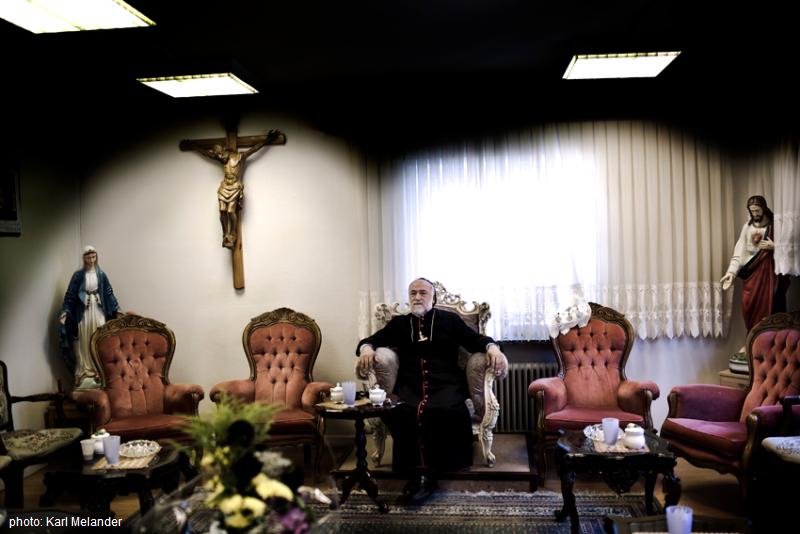
"They call me the countess. I don't have to lift a finger. They cook, bake, clean and do the laundry. Everyone is very sweet to me, especially the children." She is no longer alone, she has replaced the company of the liquor with that of Iraqis. She gets 8,000 SEK a month from the Iraqis. Her own rent is paid by Social security.
After the meeting with "the countess," I went down to Geneta Centrum. There you can find a pizzeria that has "lahmo and ajin," a specialty made of minced meat and a mix of herbs that is spread on thin pizza dough. There is also a small bakery that makes breads from recipes of several different countries. Amo (uncle) Yakup sells bulgur, melon seeds and other treats that we from the Middle East love to munch on. The tobacco shop is also still there. All shops are run by Assyrians. But the neighborhood has changed. It was cleaner before. Calmer back in my days. More multicultural. There were more ethnic Swedes living here. Now neighborhoods like Geneta are almost entirely monocultural, almost exclusively inhabited by Assyrians.
Back then most Assyrians came from Turkey and Syria, now there is a new group -- the Iraqis. It is not without tension. In the schools fights erupt between the recently arrived Iraqi Assyrians and those that are born in Mesopotälje. In Ronnaskolan nine out of ten children are Assyrians.
But when danger lurks, when we really need help, we are there for each other. The Swedish Migration Board has decided that the conflict in Iraq is not a conflict. Every asylum seeker is to be tried individually. Those who are denied asylum are to be returned to Iraq. Prime Minister of Iraq Nuri al-Maliki has promised Swedish Prime Minister Fredrik Reinfeldt to protect the Iraqis that are sent back to cities like Baghdad. If we weren't talking about the lives of human beings I would have said "allow me to laugh." An Assyrian without money and extremely good connections will not live long in Baghdad.
The stories are so similar to each other: stories about sudden and brutal death, about fleeing and fraudulent smugglers. Stories that rhyme badly with a summer lunch in Sweden, but in Mesopotälje they are no further away than today's special.
I meet Nemer at my cousin's restaurant. In the summer of 2007 he fled from Iraq. Three family members had been brutally murdered by fundamentalists and four survivors decided to go to Södertälje. They sold everything they owned to pay the smuggler. First they were taken to Turkey, then to Ukraine. In Kiev the smuggler disappeared with all their money. For six months they were stranded.
A Russian Assyrian helped them to find work under the table. The salaries, together with money wired from relatives in Sweden, were enough to contact and pay a new, Swedish, smuggler. He promised that they would be in Södertälje within a week. He went to Kiev, gave them false passports and drove them to Slovakia.
He took them to a barn in the country side and told them he'd be back within 24 hours. After three days without hearing from the smuggler and out of food, they decided to leave the barn. They walked and walked for ten hours, until light beams were pointed in their faces. It was the police. They were interrogated and they told the truth about their escape from a city in Iraq where the majority were Muslim and where fundamentalists had either killed Christians or forced them to flee.
After the interrogation, which is regarded as an asylum application, they were released. The smuggler had been arrested and had to stay behind bars. A relative bought them new false passports so that they could come to Sweden. Finally in Sweden they told the truth to the authorities. By doing so they gave up their right to seek asylum in Sweden.
The Schengen accords state that the country which the asylum seeker first enters is also the country that should handle the asylum application process. You are therefore sent back to that first country within the EU. The very day that I met Nemer his family had an appointment at the Migration Board. They were to be given notice on when they would be sent to Slovakia and what the specifics of the deportation would be. From Slovakia people get deported to Iraq. The family won't go.
In February of last year the government of Sweden made an "agreement of returning Iraqis" with the government of Iraq. After that the forced deportations were supposed to speed up. In Stockholm county, where the police had received 3,600 cases from the Migration Board, 3,400 people have gone underground and are now wanted by the police.
The Iraqis in Södertälje offer a range of new business opportunities. Later that evening I am sitting in a room for Iraqi asylum seekers. A young man approaches me cautiously and asks "will I be thrown out of the country if I have committed a crime in Sweden?" He tells me that he hit an old man with his car at the parking lot. He was backing out of the parking spot and didn't see the man until it was too late. Afterwards he apologized and asked if he should call an ambulance. The older man had answered that he was ok and that Nishwan, the Iraqi, shouldn't worry. The next time Nishwan came to the parking lot the older man's son had appeared and told Nishwan that he knew that he was an asylum seeker that lived in 99, and that he had hit his dad with his car. Now he wanted 10,000 SEK, otherwise, he said, he would report Nishwan to the Migration Board.
A phone call to the Migration Board shows that Nishwan's application will not be affected by him hitting an older man with his car. After hanging up I asked Nishwan why he hadn't asked his lawyer to help him. "But he's even more expensive, I have already payed him 15,000 SEK." What Nishwan doesn't know is that the lawyer already receives his salary from the Migration Board.
The following morning I am giving some teenaged relatives a ride in my convertible Mercedes. We enjoy the sun, the wind in our faces, and teenage music streaming from the speakers. "Nuri! Nuri! Here!" I hear someone shout. It is Nishwan.
"Down, get down. It's an Iraqi!" hisses my fourteen year old cousin. She doesn't want people to see us talking with an Iraqi. It's so embarrassing.
My cousin's spontaneous reaction reminds me of a document, a decree from Saddam Hussein's intelligence agency. I got the document when I was working on revealing that there were Iraqi spies in Sweden. It said: "No matter the cost you shall hinder the Assyrians from uniting." Before we divided on what to call ourselves. Now we also disunite based on where we're from and when we came to Sweden.
By Nuri Kino

or register to post a comment.